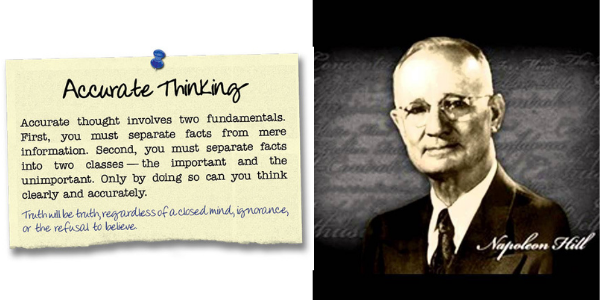Introduction
The tenth principle of Napoleon Hill's 17 principles of success is the Accurate Thinking. Accurate thinking is a mental process that helps us to differentiate between relevant and irrelevant facts. It is more than critical thinking which enables us to inspect the thoughts of others or agenda. Accurate thinking helps us to create new thoughts, new agenda or new visions. It inspires us to be proactive and not reactive. Jonas Salk’s accurate thinking helped humanity in the discovery of Polio vaccine. George Marshall’s diligent planning ensured revitalisation of Europe’s economy after Hitler's downfall. Mother Clara Hale’s idea of making Hale house provided shelter and much required care for unwanted children and children who were born addicted to drugs. None of the above mentioned achievements had materialised in the absence of accurate thinking. No one can ever achieve great things without learning to think accurately.
The Thinking Process
The accurate thinking is based upon two types of reasoning:a) Induction: The term inductive reasoning helps us to draw broader generalisation from specific information while remaining open to the fact that generalisation may not be 100% accurate.
b) Deduction: In this reasoning, specific conclusions are drawn from general logical assumptions.
We can also become accurate thinker by taking two important steps: 1. Separate facts from fictions, hearsay, opinions and unproved hypothesis. 2. Separate facts into two categories: Unimportant and important.
Napoleon Hill shared his experience while working for President Woodrow Wilson during World War 1. Napoleon asked the president “ What effect he believed WW1 would have on civilisation?” The answer of Woodrow Wilson was very important and he said, “ I can’t answer your question because I don’t have facts and figures with me”. If we also remember these golden words of Woodrow Wilson then we will make distance from biases, prejudices and emotional feelings.
7 Rules of Accurate Thinking
1. Never accept any data or opinion presented by any person. Always check the source of the data and verify its accuracy.2. Cross verify the free advice as it is generally based upon false premises.
3. Be alert whenever you hear bad words about others. Bad words are always biased in nature.
4. Whenever you sort some information about others then do not disclose your own inclination or perspective. People have a general tendency of pleasing others and they will change facts accordingly.
5. Each and every thing have a proof and in case proof is not available then it is safer to forget that fact.
6. There is a miraculous thing about the false and truth. We can sense the truth and false by our subconscious mind. Hence accept this fact and build necessary intuitive faculty to sense what is false and what is truth.
7. Inculcate the habit of asking “How do you know?” Whenever someone project some unbelievable information.


Comments
Post a Comment
Please do not add any spam link in the comment box